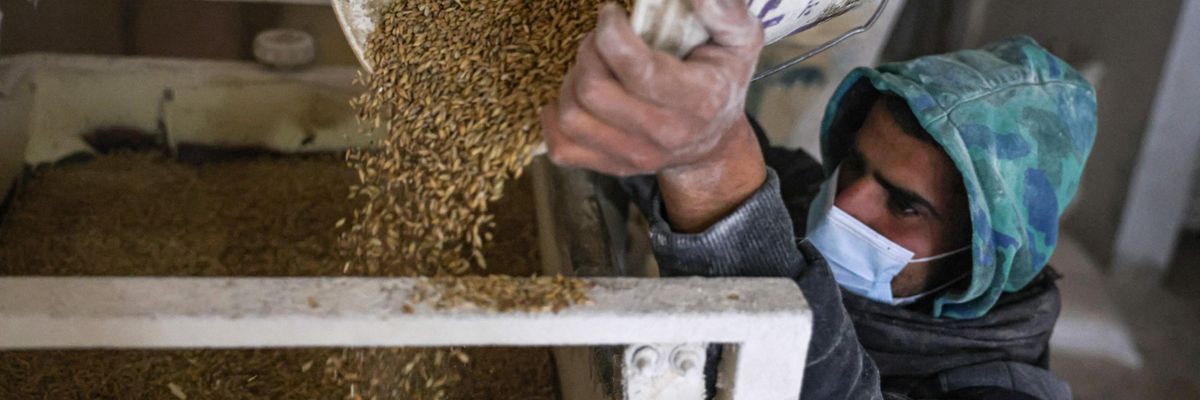
A Palestinian man works in a wheat mill in Rafah, in the southern Gaza Strip, on March 21, 2022. (Photo: Said Khatib/AFP via Getty Images)
Aid Group Warns Palestine Wheat Reserves Could Soon Run Out Amid Ukraine Crisis
"The reliance on imports and the constraints forced upon them by Israel's continuing military occupation, settler violence, and land grabs are compounding the food crisis," said Oxfam International.
The humanitarian group Oxfam International warned Monday that wheat flour reserves in the occupied Palestinian territories could run out within the next three weeks as Russia's assault on Ukraine continues, pushing prices to all-time highs and throwing the global grain market into chaos.
"Palestinian households are being hit hard by rising global food prices, and many are struggling to meet their basic needs."
Prior to the war, Russia and Ukraine together supplied nearly 30% of the world's wheat, with a large portion of its exports going to the Middle East.
The Palestinian Authority, which governs part of the Israeli-occupied West Bank, imports around 95% of its wheat, according to Oxfam. Israel, which often throttles the occupied territories' trading and restricts their agricultural development, imports half of its grain and cereals from Ukraine.
If Russia's war on Ukraine continues, Oxfam noted, experts believe the Palestinian territories' diminishing wheat stocks could be exhausted in two to three weeks.
"Palestinian households are being hit hard by rising global food prices, and many are struggling to meet their basic needs," said Shane Stevenson, Oxfam's country director in the occupied Palestinian territories and Israel. "The reliance on imports and the constraints forced upon them by Israel's continuing military occupation, settler violence, and land grabs are compounding the food crisis."
\u201cMost households in the #Gaza Strip are now buying food on credit. Many families are eating less and lower quality of food items. Families are cutting out more expensive food such as fruit, meat and chicken that are necessary for a healthy diet.\nMore: https://t.co/tTHVXAmIDq\u201d— Oxfam International (@Oxfam International) 1649658751
Oxfam reported that food insecurity across the Palestinian territories has jumped to 31.2%, and roughly 2.1 million people there will require humanitarian assistance this year.
To prevent the hunger crisis in the territories from intensifying, Oxfam called on the international community to "urgently adopt a common and coordinated economic and diplomatic position that challenges Israel's restrictive policies and allows Palestinians to invest in local food production and infrastructure."
"It is difficult to describe the true level of damage that all this is causing on people's lives--it is devastating."
"Every day we meet people who are searching for jobs and money just to feed their children. We feel very stuck at this stage," Najla Shawa, Oxfam's head of food security in Gaza, said in a statement Monday. "How can we draw attention from the international community to the deteriorating socio-economic situation in Gaza?"
"Our work in Gaza is becoming increasingly challenging," Shawa added. "It is difficult to describe the true level of damage that all this is causing on people's lives--it is devastating."
Last week, the U.N. Food and Agriculture Organization (FAO) said that global food prices soared to record levels in March, driven by the rising costs of cereals and vegetable oils. Ukraine is the world's largest exporter of sunflower oil.
Price surges and war-induced supply chain disruptions are endangering the food supply of millions of people in Yemen and other nations ravaged by years of military conflict.
The World Food Programme, which purchases half of its grain from Ukraine, noted in March that "imports from Ukraine account for 31% of the wheat arriving in Yemen in the past three months--prices are suddenly seven times higher than they were in 2015."
An Urgent Message From Our Co-Founder
Dear Common Dreams reader, The U.S. is on a fast track to authoritarianism like nothing I've ever seen. Meanwhile, corporate news outlets are utterly capitulating to Trump, twisting their coverage to avoid drawing his ire while lining up to stuff cash in his pockets. That's why I believe that Common Dreams is doing the best and most consequential reporting that we've ever done. Our small but mighty team is a progressive reporting powerhouse, covering the news every day that the corporate media never will. Our mission has always been simple: To inform. To inspire. And to ignite change for the common good. Now here's the key piece that I want all our readers to understand: None of this would be possible without your financial support. That's not just some fundraising cliche. It's the absolute and literal truth. We don't accept corporate advertising and never will. We don't have a paywall because we don't think people should be blocked from critical news based on their ability to pay. Everything we do is funded by the donations of readers like you. Will you donate now to help power the nonprofit, independent reporting of Common Dreams? Thank you for being a vital member of our community. Together, we can keep independent journalism alive when it’s needed most. - Craig Brown, Co-founder |
The humanitarian group Oxfam International warned Monday that wheat flour reserves in the occupied Palestinian territories could run out within the next three weeks as Russia's assault on Ukraine continues, pushing prices to all-time highs and throwing the global grain market into chaos.
"Palestinian households are being hit hard by rising global food prices, and many are struggling to meet their basic needs."
Prior to the war, Russia and Ukraine together supplied nearly 30% of the world's wheat, with a large portion of its exports going to the Middle East.
The Palestinian Authority, which governs part of the Israeli-occupied West Bank, imports around 95% of its wheat, according to Oxfam. Israel, which often throttles the occupied territories' trading and restricts their agricultural development, imports half of its grain and cereals from Ukraine.
If Russia's war on Ukraine continues, Oxfam noted, experts believe the Palestinian territories' diminishing wheat stocks could be exhausted in two to three weeks.
"Palestinian households are being hit hard by rising global food prices, and many are struggling to meet their basic needs," said Shane Stevenson, Oxfam's country director in the occupied Palestinian territories and Israel. "The reliance on imports and the constraints forced upon them by Israel's continuing military occupation, settler violence, and land grabs are compounding the food crisis."
\u201cMost households in the #Gaza Strip are now buying food on credit. Many families are eating less and lower quality of food items. Families are cutting out more expensive food such as fruit, meat and chicken that are necessary for a healthy diet.\nMore: https://t.co/tTHVXAmIDq\u201d— Oxfam International (@Oxfam International) 1649658751
Oxfam reported that food insecurity across the Palestinian territories has jumped to 31.2%, and roughly 2.1 million people there will require humanitarian assistance this year.
To prevent the hunger crisis in the territories from intensifying, Oxfam called on the international community to "urgently adopt a common and coordinated economic and diplomatic position that challenges Israel's restrictive policies and allows Palestinians to invest in local food production and infrastructure."
"It is difficult to describe the true level of damage that all this is causing on people's lives--it is devastating."
"Every day we meet people who are searching for jobs and money just to feed their children. We feel very stuck at this stage," Najla Shawa, Oxfam's head of food security in Gaza, said in a statement Monday. "How can we draw attention from the international community to the deteriorating socio-economic situation in Gaza?"
"Our work in Gaza is becoming increasingly challenging," Shawa added. "It is difficult to describe the true level of damage that all this is causing on people's lives--it is devastating."
Last week, the U.N. Food and Agriculture Organization (FAO) said that global food prices soared to record levels in March, driven by the rising costs of cereals and vegetable oils. Ukraine is the world's largest exporter of sunflower oil.
Price surges and war-induced supply chain disruptions are endangering the food supply of millions of people in Yemen and other nations ravaged by years of military conflict.
The World Food Programme, which purchases half of its grain from Ukraine, noted in March that "imports from Ukraine account for 31% of the wheat arriving in Yemen in the past three months--prices are suddenly seven times higher than they were in 2015."
The humanitarian group Oxfam International warned Monday that wheat flour reserves in the occupied Palestinian territories could run out within the next three weeks as Russia's assault on Ukraine continues, pushing prices to all-time highs and throwing the global grain market into chaos.
"Palestinian households are being hit hard by rising global food prices, and many are struggling to meet their basic needs."
Prior to the war, Russia and Ukraine together supplied nearly 30% of the world's wheat, with a large portion of its exports going to the Middle East.
The Palestinian Authority, which governs part of the Israeli-occupied West Bank, imports around 95% of its wheat, according to Oxfam. Israel, which often throttles the occupied territories' trading and restricts their agricultural development, imports half of its grain and cereals from Ukraine.
If Russia's war on Ukraine continues, Oxfam noted, experts believe the Palestinian territories' diminishing wheat stocks could be exhausted in two to three weeks.
"Palestinian households are being hit hard by rising global food prices, and many are struggling to meet their basic needs," said Shane Stevenson, Oxfam's country director in the occupied Palestinian territories and Israel. "The reliance on imports and the constraints forced upon them by Israel's continuing military occupation, settler violence, and land grabs are compounding the food crisis."
\u201cMost households in the #Gaza Strip are now buying food on credit. Many families are eating less and lower quality of food items. Families are cutting out more expensive food such as fruit, meat and chicken that are necessary for a healthy diet.\nMore: https://t.co/tTHVXAmIDq\u201d— Oxfam International (@Oxfam International) 1649658751
Oxfam reported that food insecurity across the Palestinian territories has jumped to 31.2%, and roughly 2.1 million people there will require humanitarian assistance this year.
To prevent the hunger crisis in the territories from intensifying, Oxfam called on the international community to "urgently adopt a common and coordinated economic and diplomatic position that challenges Israel's restrictive policies and allows Palestinians to invest in local food production and infrastructure."
"It is difficult to describe the true level of damage that all this is causing on people's lives--it is devastating."
"Every day we meet people who are searching for jobs and money just to feed their children. We feel very stuck at this stage," Najla Shawa, Oxfam's head of food security in Gaza, said in a statement Monday. "How can we draw attention from the international community to the deteriorating socio-economic situation in Gaza?"
"Our work in Gaza is becoming increasingly challenging," Shawa added. "It is difficult to describe the true level of damage that all this is causing on people's lives--it is devastating."
Last week, the U.N. Food and Agriculture Organization (FAO) said that global food prices soared to record levels in March, driven by the rising costs of cereals and vegetable oils. Ukraine is the world's largest exporter of sunflower oil.
Price surges and war-induced supply chain disruptions are endangering the food supply of millions of people in Yemen and other nations ravaged by years of military conflict.
The World Food Programme, which purchases half of its grain from Ukraine, noted in March that "imports from Ukraine account for 31% of the wheat arriving in Yemen in the past three months--prices are suddenly seven times higher than they were in 2015."

